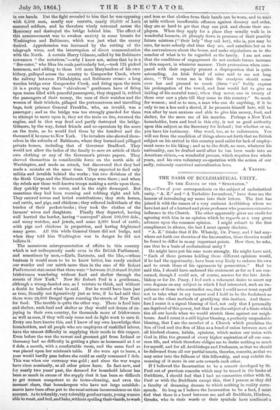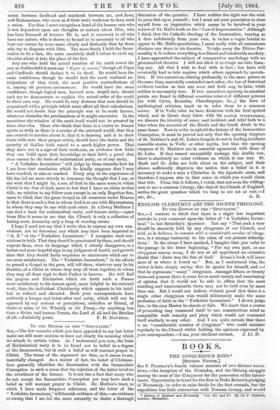THE BASIS OF ECCLESIASTICAL UNITY.
TO THE EDITOR. OF THE "SPECTATOR."
Strt,—Two of your correspondents on the subject of ecclesiastical unity, " A. Z." and " A Yorkshire Incumbent," have done me the honour of introducing my name into their letters. The first has joined it with the names of a very eminent Archbishop whom we have lost and of a learned and pious professor who possesses extensive influence in the Church. The other apparently gives me credit for agreeing with him in an opinion which he regards as a very great advance upon the common opinion. I might submit to the first compliment in silence, the last I must openly disclaim.
" A. Z." thinks that if Dr. Whately, Dr. Pusey, and I had any- where set forth our theories of the Incarnation, those theories would be found to differ in many important points. How then, he asks, can that be a basis of ecclesiastical unity ?
He might have put his case more strongly. He might have said, " Each of these persons holding these different opinions would, if he had the opportunity, have been very likely to enforce his own and to crush those of his opponents by persecution." Had he said this, I should have endorsed the statement as far as I am con- cerned, though I could not, of course, answer for the late Arch- bishop or for Dr. Pusey. 1 feel such a vehement desire to assert my own dogmas on any subject in which I feel interested, such an im- patience of those who contradict me, that I could never trust myself not to take what in my inmost soul I hold to be the foolishest as well as the vilest methods of gratifying this instinct. And there- fore I count it a signal blessing of God, not only that I personally am deprived of this power, but that I am the subject of a State which ties all our hands when we would stretch them against our neigh- bours. And I count it a still higher blessing, a perfectly unspeakable blessing, that I am the member of a Church which proclaims the Son of God and the Son of Man as a bond of union between men of all kindred classes, habits, opinions, which makes our union with God in Him the ground of every higher aspiration of all our com- mon life, and which therefore obliges me to desire nothing so much for myself, and for all Archbishops and Professors, as that we should be delivered from all our partial tenets, theories, conceits, as that we may enter into the fullness of this fellowship, and may exhibit the meaning of it more in our acts towards each other.
If I believed the Incarnation to be a conceit developed by St. Paul out of previous conceits which may be traced in the books of Buddhists, I should feel that I had no connection either with St. Paul or with the Buddhists except this, that I possess as they did a faculty of dreaming dreams to which nothing in reality corre- sponds. So long as I believe the Incarnation to be a fact, I must feel that there is a bond between me and all Buddhists, Hindoos, Greeks, who in their words or their symbols have confessed a union between .Godhead and manhood, between me, and Jews, and Mahometans, who seem as if their main work was to deny such a union. For then I must recognize a head of the human race who is not dependent upon our thoughts or notions about Him, who has been dreamed of because He is, and is necessary to all who have our nature, who is shown to be and to be necessary to all who bear our nature by none more clearly and distinctly than by those who try to dispense with Him. The more firmly I hold the Incar- nation to be a fact, the more resolutely shall I refuse to exalt my theories about it into the place of the fact.
Any one who held the actual rotation of the earth round the sun as Galileo held it must say "Epur si »move," though all Popes and Cardinals should declare it to be fixed. He would have the same confidence, though he should find the most confused an- ticipations of that truth, the most positive contradictions of it, among all previous astronomers. He would have the same confidence, though logical men, learned men, stupid men, should each try to demonstrate or explain the actual order of the world in their own way. He would be very desirous that men should be acquainted with a principle which must affect all their calculations. He would not doubt that the principle was to be made known, whatever obstacles the proclamation of it might encounter. In the meantime the rotation of the earth itself would not be arrested by these obstacles. Those who think that there is a centre to human spirits as truly as there is a centre of the outward world, that they are created to revolve about it, that it is drawing and is to draw those wills into their proper orbits, should have the desire and the security of Galileo both raised to a much higher power. That they have not is a sign of their weakness, an evidence how little they can build upon their knowledge or their faith, a proof that these cannot be the basis of ecclesiastical unity, or of any unity.
" A Yorkshire Incumbent" will judge by these remarks how far I am from that conclusion which he kindly supposes that I may have reached, or almost reached. Every step in the experience of life has led me more utterly to renounce the thought that I am, or the wish that I might be, a son of God in the same sense in which Christ is the Son of God, more to feel that I have no claim to that title, no relation to my fellow-men except in an only Begotten Son, more to think that the great Gospel to all creatures under Heaven is that there is such a Son in whom God is at one with His creatures, in whom they may be one with each other. In a living Mediator I can find a basis for ecclesiastical unity and human unity,—apart from Him it seems to me that the Church is only a collection of hating sects, humanity only a heap of warring atoms.
I hope I need not say that I write thus to express my own con- victions, not to denounce any which may have been imparted to "A. Z." or the "Yorkshire Incumbent." I recognize such con- victions in both. That they should be penetrated bythem, and should express them, even in language which I utterly disapprove, is a better and more hopeful sign in my judgment of health and growth than that they should lazily acquiesce in statements which are to me most satisfactory. The " Yorkshire Incumbent," in his efforts to preach a Gospel to the poor, will tell them, whatever may be his theories, of a Christ in whom they may all trust together, in whom they may all draw nigh to their Father in heaven. He will find the prayers and Eueharists which set forth such a Person more satisfactory to his inmost spirit, more helpful to his outward work, than the individual Christianity which appears to his intel- lect so refined and elevated. Both your correspondents have evidently a hunger and thirst after real unity, which will not be appeased by any notions or perceptions, orthodox or liberal, of theirs or mine, of Dr. Whately or Dr. Pusey,—by anything less than a divine and human Person, the Lord of all and the Brother































 Previous page
Previous page